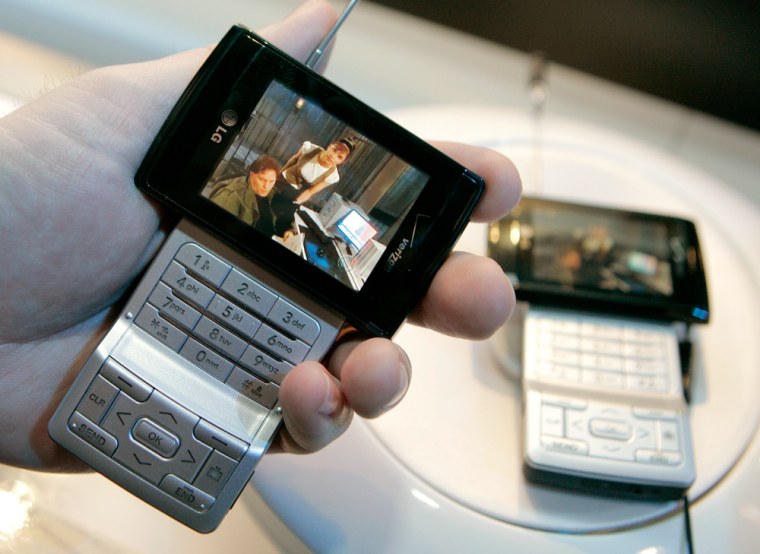It looks like Hollywood and Silicon Valley have kissed and made up. The folks who make movies, TV shows and music have had an often hostile relationship over the years with the companies that make the cool new devices to display, record and move that content around.
Only a few years ago, entertainment executives railed against digital video recorders that allowed TV viewers to skip ads, and lambasted music players that encouraged users to "rip, mix, burn" their songs onto portable devices.
But over the past year or so, studios have done an about face and now regularly court technology ventures such as YouTube. Rupert Murdoch's News Corp. went so far as to spend $580 million buying the social networking site MySpace, which is now jammed with snippets of video and music that entertainment companies once went to court to have taken off such sites.
Nowhere has this new, almost giddy relationship been better displayed than at this year's International Consumer Electronics Show, where disruptive technologies that once gave studio executives nightmares often make their debut.
Leslie Moonves, chief executive of CBS Corp., and Robert Iger, chef executive of The Walt Disney Co. both gave keynote addresses this year that emphasized cooperation between studios and device makers.
"If you asked me two years ago, did I want Disney in the keynote? No," said Gary Shapiro, chief executive of the Consumer Electronics Association, annual sponsor of the CES show. "Disney was the poster child in Washington for the most anti-technology company there was."
Moonves made the most aggressive push at this year's show, sharing his stage with Chad Hurley, co-founder of YouTube, Philip Rosedale, founder of virtual reality creator Linden Lab, and Blake Krikorian, founder of Sling Media. That company's Slingbox enables TV viewers to stream live and recorded video over the Internet from a home cable box to a computer.
A packed ballroom cheered Moonves when he said that the lines between "old media" and "new media" have been erased.
Moonves even featured several "mash-ups" in his speech. The short videos typically splice together clips taken from films or TV shows, often illegally, to create something new. Several studios have sued to remove such clips from Web sites such as Guba.com and YouTube.
"Everybody, Silicon Valley as well as the Hollywood community, has come to realize that life was a better place if we figured out how to do things together," Moonves said in an interview.
"Anybody that can help us get our content out to any place, any time anywhere, ultimately is a very good thing for us and for them. That's the key lesson everyone has learned in the past few years."
Disney's Iger sparked much of the current rapprochement in October 2005 when, only weeks after being named CEO, he signed a deal to sell individual ABC-TV episodes on Apple Computer Inc.'s iTunes store.
The groundbreaking deal sparked a flurry of similar deals, with networks selling shows on iTunes, Google Inc.'s video store and elsewhere. This week Apple said it would sell movies from Viacom Inc.'s Paramount Pictures, increasing Apple's online selection from about 100 to about 250.
Warner Bros., a unit of Time Warner Inc., even agreed to distribute its content using peer-to-peer technology from BitTorrent, but only after the once-renegade company agreed to share revenue.
"Change is always difficult for people who have invested millions or billions of dollars in basic business models," said Dan Glickman, president of the Motion Picture Association of America, which lobbies on behalf of the studios. "Companies that keep up with what consumers want will make money."
The animosity between the two camps goes back a long way.
Studios initially feared television in the 1950s, refusing to produce shows for the medium that executives were convinced would kill the motion picture business. Studios sued to block the videocassette recorder, convinced the technology would do nothing but lead to rampant piracy. The legal case eventually made it to the U.S. Supreme Court and established the rights of consumers to "time shift" content — record it at one time and watch it at another.
Today, studios make far more money selling movies on DVD than they do in theaters.
But not all the hatchets have been buried.
Studios still lobby aggressively for laws to strengthen copyrights and force TV manufacturers and other electronics makers to plug digital holes through which content might leak onto the Internet. Studios and record companies also worked to pass the Digital Millennium Copyright Act, which can assess penalties of $150,000 for every song or movie illegally downloaded.
"This revolution is not a done deal," Shapiro said during his opening keynote address this week. "Piracy is wrong. But ordinary consumers are not pirates. And private conduct may not be authorized, but that does not mean it is piracy."
